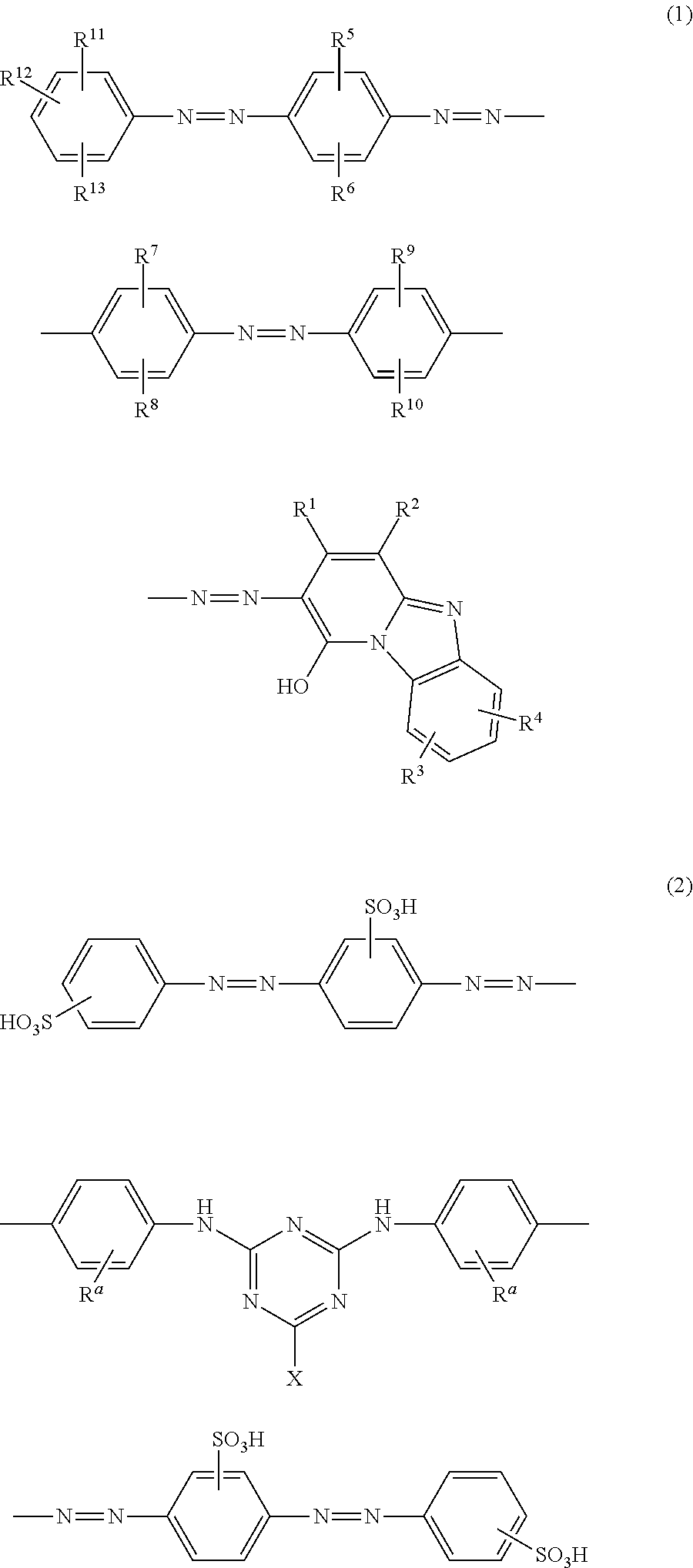Ink composition, inkjet recording method and colored body
a technology of inkjet recording and composition, which is applied in the direction of organic dyes, polyazo dyes, other printing materials, etc., can solve the problems of low color saturation, high print density, and difficulty in reducing light source dependence of hue, and achieve low color saturation, low color saturation, and good color saturation
- Summary
- Abstract
- Description
- Claims
- Application Information
AI Technical Summary
Benefits of technology
Problems solved by technology
Method used
Image
Examples
example 1
(Step 1)
[0309]51.8 parts of 4-chloro-3-nitroaniline was dissolved in 60.0 parts of N-methyl-2-pyrrolidone, and 35.2 parts of acetic anhydride was added dropwise thereto over about 15 minutes. After the dropwise addition, the mixture was allowed to react for 2 hours at 40° C. to 50° C., and then the reaction liquid was added to 400 parts of water. The reaction liquid was stirred for 30 minutes at room temperature, subsequently the solid thus precipitated out was filtered, and the solid thus obtained was washed with 100 parts of water on a funnel. The solid was separated and dried, and thus 63.0 parts of the compound represented by the following formula (19) was obtained.
[0310]
(Step 2)
[0311]42.9 parts of the compound represented by the formula (19) obtained in Example 1 (Step 1) was dissolved in 115.0 parts of N-methyl-2-pyrrolidone, and 40.9 parts of sodium 3-mercaptopropane sulfonate and 29.0 parts of potassium carbonate were added thereto. After the addition, the mixture was heated...
example 2
[0327]Sodium salt of 6.3 parts of the compound represented by the formula (28) obtained in Example 1, and 14 parts of lithium chloride were added to 140 parts of water, and an aqueous solution was obtained by stirring the mixture. 400 parts of 2-propanol was added thereto, the solid thus precipitated out was separated by filtration, and thus wet cake was obtained. The wet cake thus obtained and 12.5 parts of lithium chloride were added to 150 parts of water again, and the mixture was stirred to obtain an aqueous solution. 350 parts of 2-propanol was added thereto, the solid thus precipitated out was separated by filtration, and thus wet cake was obtained. The wet cake thus obtained was dissolved in 80 parts of water, and 150 parts of 2-propanol was added thereto. The solid thus precipitated out was separated by filtration, and thus wet cake was obtained. The wet cake thus obtained was dissolved again in 40 parts of water, 100 parts of 2-propanol was added thereto, and the solid thus...
example 3
(Step 1)
[0329]15.2 parts of 2-methyl-6-nitroaniline was dissolved in 300 parts of methanol. The solution thus obtained was transferred into an autoclave, 2.0 parts of 5% Pd / carbon was added thereto, and the mixture was allowed to react at 20° C. to 30° C. at a hydrogen pressure of 0.2 MPa to 0.5 MPa, until the absorption of hydrogen had run its course. Thereafter, the reaction was continued for another 30 minutes at the same temperature. The catalyst (5% Pd / carbon) was separated by filtration, and thereby, a solution (filtrate) containing the compound represented by the following formula (29) was obtained.
[0330]
(Step 2)
[0331]13.0 parts of methyl cyanoacetate was added to 200 parts of a solution containing the compound represented by the formula (29) obtained in Example 3 (Step 1), and the mixture was heated to reflux for 30 minutes. Subsequently, methanol was concentrated under reduced pressure, and 100 parts of water was added thereto, followed by sodium carbonate to adjust the pH ...
PUM
| Property | Measurement | Unit |
|---|---|---|
| temperature | aaaaa | aaaaa |
| temperature | aaaaa | aaaaa |
| pH | aaaaa | aaaaa |
Abstract
Description
Claims
Application Information
 Login to View More
Login to View More - R&D
- Intellectual Property
- Life Sciences
- Materials
- Tech Scout
- Unparalleled Data Quality
- Higher Quality Content
- 60% Fewer Hallucinations
Browse by: Latest US Patents, China's latest patents, Technical Efficacy Thesaurus, Application Domain, Technology Topic, Popular Technical Reports.
© 2025 PatSnap. All rights reserved.Legal|Privacy policy|Modern Slavery Act Transparency Statement|Sitemap|About US| Contact US: help@patsnap.com



